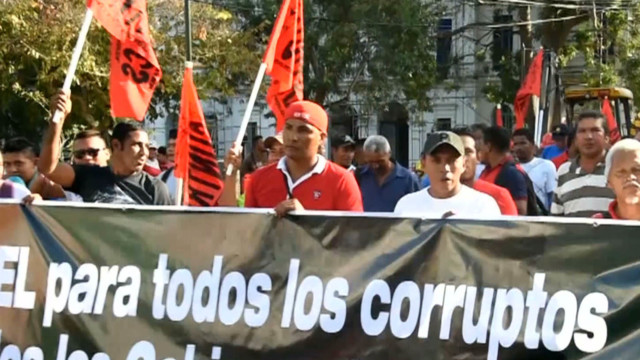Colombia’s President Juan Manuel Santos has been presented with an official questionnaire from the country’s National Electoral Council.
It will serve as testimony as the council investigates Santos’ alleged election campaign ties to a scandal-plagued Brazilian construction company.
CGTN’s Michelle Begue reports.

The president agreed to voluntarily cooperate in the probe examining both his campaigns — in 2010 and 2014. The investigation is looking into contributions allegedly received Odebrecht – already marred in scandal.
Santos’ former campaign manager, Roberto Prieto, has admitted he funneled illegal funds from Odebrecht into the 2010 campaign. Prieto has also acknowledged Odebrecht paid $400,000 to a vendor to print campaign posters in 2014.
In March, President Santos publicly apologized for the 2010 use of illegal funds, though he denied knowing anything about the transactions at the time. What Santos knew and when he knew it – are likely at the heart of the National Electoral Council’s questionnaire delivered to Santos on Monday.
While Santos has not commented on his testimony, he did talk about the investigation in a radio interview Monday morning insisting Odebrecht was not rewarded during his time in office.
“If you look at Odebrecht during my government, they never received preferential treatment. Because of 22 biddings they only won 1 or 2 projects,” Juan Manuel Santos, Colombian President said.
According to a United States investigation, Odebercht doled out nearly $800 million in bribes across four continents. The Brazilian firm is involved in the largest global corruption scandal in modern history.
Whether or not the firm bribed President Santos’ campaign, fallout from the Odebrecht scandal is impacting the region.
According to American bond rating company Moody’s – Odebrecht’s actions have scared investors away from doing business in Latin America – significantly undermining infrastructure and energy projects.
“In the very short term it is possible that they are saying ‘let’s stop investments in 2017′ because they are waiting to analyze the political risks. What is at play is that there is a lot of uncertainty regarding the elections in 2018. The political risk may weigh heavier than the simple issue of corruption,” Economist Jorge Gaitan Villegas said.
Based on the President’s testimony and other information collected during a preliminary investigation, the National Electoral Council will decide whether or not to open a formal investigation into Santos’ election campaigns.
 CGTN America
CGTN America

